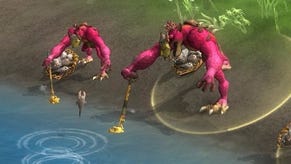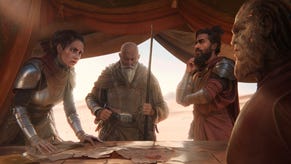Games are not stories - Wright
BAFTA speech summary.
Will Wright, creator of SimCity, the Sims and forthcoming open-ended evolution game Spore, gave the inaugural annual BAFTA Video Games lecture at an event in London last night, and GamesIndustry.biz was there to capture all the details.
Following on from Tuesday's Fellowship award at the BAFTA Video Games Awards, Wright spent half an hour expanding on the subject of linear versus interactive media, before spending some time answering general questions from the audience.
His argument dealt with the different roots of linear stories and interactive games, and the mistake people tend to make in thinking of the two in the same context.
"We first had books, then we had live theatre, we went to radio, movies, then television, and people have been interpreting games through this lens, as though they're the natural evolution to this.
"Well, in some senses I think games have a very different evolutionary heritage from what I call linear storytelling media.
"Games are rooted as far back, if not further, than the printed word, and sports as well, then the idea of toys and general play.
"Now if you actually look at play, obviously it evolved for a reason. Animals play in the wild, it's a form of education - they play out little scenarios which help them survive into the future.
"And then you can look at babies and one of the first things they do is to start interacting with the real world, they wave their arms around and at some point they understand that they can control this thing that's beating them in the face, that they can pick up things and manipulate them - then interactivity with the environment is their first natural form of education."
"Storytelling is a little bit different, it's based upon these functions that we have as humans - language, imagination and empathy, and these are all prerequisites for story, and in some senses it's learned behaviour."
Wright also addressed common concerns that are aired by non-gamers and certain sections of the mainstream media about the impact that videogames are having on society.
"We see kids playing games, and getting obsessed with them, and it's a continual cultural concern with videogames, and I heard a story a while back, which was interesting.
"There was this guy, and he walked into a room, and he saw a person sitting on the other side of the room, absorbed in this device. And he was so fixated on this device that he didn't even notice this fellow walking into the room - he could tell, it was like he wasn't even there, and he'd displaced himself to another time and place.
"And it creeped him out, he thought this guy was possessed by the devil.
"What this was, it was the sixteenth century, and it was the first time he'd seen somebody reading a book."
Wright went on to draw on historical quotes detailing the first reactions to early novels, the waltz, movies and rock music, which at each turn were regarded with suspicion and outrage.
He also talked about the way that modern videogames are designed, and drew parallels to the way that old crafts were learned.
"In game design we're still back at this old stage that I'd call the apprenticeship level. If you go back some centuries most professions, like architecture, were actually learned through apprenticeship.
"What happened was that you'd get an apprenticeship with a master, who'd actually have you practice gardening, or bricklaying, or building, or whatever it was, for many years.
"And then, when you were at the level of becoming master, he'd start teaching you the secret theories.
"And so the theory came after you actually practiced your craft for many years and had experienced a huge amount of failure, it was a kind of failure-based learning.
"Around the start of the twentieth century a lot of these professions got turned around by the education system, and so people in the schools spent several years learning the theory before you were actually allowed to practice.
"The idea was that the theory would protect you from failure because you were working on the rules that other people had learned.
"On the other hand you were not directly experiencing failure, or being allowed to innovate inside your craft as much as the apprentices were, so it's a very different model.
"Game design still doesn't really have any quality theory, so we're still very much on the apprenticeship mode."
He went on to discuss the way that linear stories are based on empathy, and that a person's ability to use imagination and evaluate the potential endings to a situation is what leads to drama.
This in turn, according to Wright, leads to a crucial difference between the notion that linear stories result in empathic responses on the part of the audience, while interactive games form an agency on the part of the gamer.
Will Wright is the first member of the videogames industry to be inducted into the BAFTA Fellowship. Last night's lecture was the first Video Games lecture to be given at BAFTA, but it will now take place annually, following the tradition already set down by the organisation's other media, film and television.
And the winner is...GamesIndustry.biz!






.png?width=291&height=164&fit=crop&quality=80&format=jpg&auto=webp)


